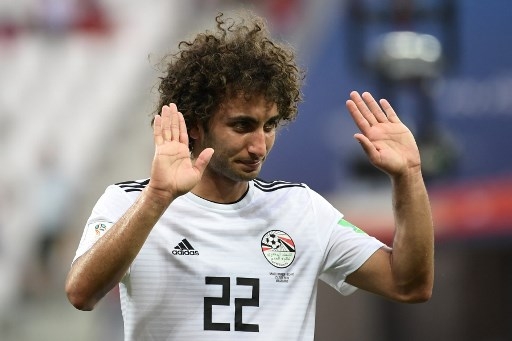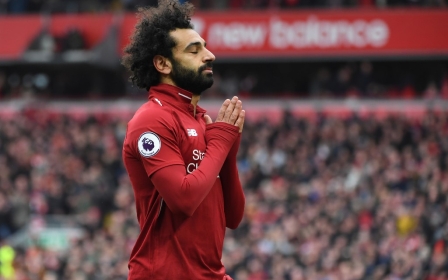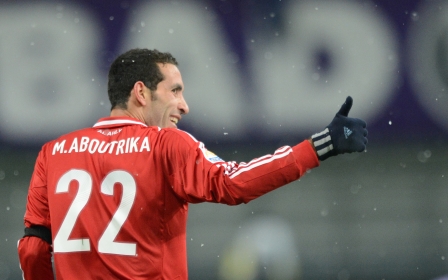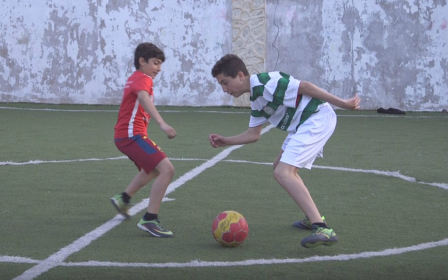Amr Warda: Sexual harassment claims against Egyptian striker spark row

With all eyes on Egypt, the host of this year's Africa Cup of Nations, the country's national football team has found itself at the centre of a raging online debate after allegations of sexual harassment were made against player Amr Warda.
Earlier this week, multiple women posted screenshots of personal messages they had allegedly exchanged with Warda which included lewd comments. One clip posted on Twitter showed him apparently exposing himself to her. Middle East Eye cannot verify the authenticity of the posts.
Online, some users called for the 25-year-old, who plays for the Greek club PAOK, to be punished and banned from playing with the national team while others urged him to be given a second chance and forgiven for "a mistake".
On Wednesday, as the Egyptian national team geared up for its game against DR Congo, the country's football federation announced that they had banned Warda from playing any further matches in the cup.
In a tweet it posted, the federation said its head Hani Abu Reda "has decided to dismiss Amr Warda from the team's camp after consulting with the team's technical and administrative staff to preserve the national team's state of discipline, focus and commitment".
Stay informed with MEE's newsletters
Sign up to get the latest alerts, insights and analysis, starting with Turkey Unpacked
Translation: The exclusion of Amr Warda from the (national team's camp)
Despite the scandal, Egypt went ahead to seal a 2-0 win against DR Congo, rising to the round of 16, in which it would face Uganda.
One of the goals was scored by star striker Mohamed Salah, who was among the many players to take to social media after the game to express support for their teammate, and call on fans to do the same.
Calling for a second chance, Salah stressed on the need to "guide and educate", adding that "shunning is not the answer".
While his opinion was echoed by others, it added more fuel to an already heated debate from those demanding punitive measures against harassers.
Salah, whose popularity among Egyptians transcends deep political divisions, was hailed in April after comments in a Time magazine interview, in which he called for a change in the way women are treated in Arab culture.
However, many saw his siding with Warda in contradiction to his previous comments.
Aston Villa defender Ahmed Elmohamady held up two fingers on each hand to make Warda’s squad number 22 after scoring the second point in DR Congo's net. According to Reuters, he told reporters that the team's players won't leave Warda alone, and that "we all make mistakes".
Warda posted a video on Facebook in which he apologised to his family, his team mates, to the EFA and to “anyone who is upset at me or anyone I have upset".
Some social media users said on Thursday that the national team's players had pressured the EFA into bringing Warda back into the championship, but there has been no official announcement about his return.
Dar el-Ifta, Egypt's central authority for issuing religious edicts, was caught up in the debate when it tweeted a message praising those who protect offenders from scandal which some interpreted as siding with Warda.
Translation: Shielding Allah's followers (from scandal) is a trait of prophets.
One of the women Warda allegedly messaged came out saying she "did not want them to continue attacking Warda" and even "asked for forgiveness", sparking a new wave of outrage from other users.
The allegations against Warda have drawn local and global attention to wider issues of sexual harassment and the treatment of women in the country, which often get pushed aside or downplayed as secondary to other political and social issues.
Sexual harassment in Egypt has made headlines locally and globally since the 2011 revolution.
Despite legislation and civil society efforts to address the practice, surveys have shown that nearly 60 percent of women have been the target of this form of violence in public spaces, and an equal proportion of men have admitted to harassing women in public.
Middle East Eye delivers independent and unrivalled coverage and analysis of the Middle East, North Africa and beyond. To learn more about republishing this content and the associated fees, please fill out this form. More about MEE can be found here.




